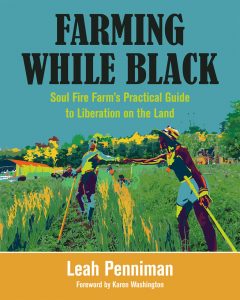The Color of Cider provides a snap shot of an early practices used to deter black farmers gaining true equality and the difficulties facing African Americans today who may view farming as a step back to the plantation.
We begin this episode with a quote from Booker T. Washington who born into slavery on April 5, 1856. He was able to learn to read and write despite the tendency of slave owners to not allow blacks to gain education. He help co-found the Tuskegee Institute.
On September 18, 1895 Washington gave a speech at the Cotton States and International Exposition in Georgia. He asserted that vocational education, which gave blacks an opportunity for economic security, was more valuable to them than social advantages, higher education, or political office. Washington asked blacks to "Cast down your buckets where you are" and focus instead on becoming agricultural and industrial laborers. In essence he was asking for blacks to not push against racial segregation.
In turn for this act of accepting one's station in the black community, he asked for a guarantee that blacks would receive a basic education and due process in the law.
The largely white audience in attendance loved the speech. The fall back from the black community, who were called at the time "Black Intellectuals" was immediate outrage. W.E.B. DuBois, also a famous black activist called Washington's speech, the"Atlanta Compromise."
Du Bois denounced Washington platform to accept ones position.
What was curious about Washington was that he asked Black Americans to accept their unequal position, while at the same time secretly funded litigation for civil rights cases.
Five years later, in 1900 Washington founded the National Negro Business League, with the mission of promoting the economic development of African Americans. He wrote a ground breaking auto biographical book called Up From Slavery.
One particular quote/story from B. T. Washington makes the case of why it was and so hard for Black to gain upward mobility. This comes from an article in the Country Gentleman magazine described as a journal for The Farm, The Garden and The Fireside.
"In one case I happen to remember a family that had three or four strong persons at work every day that was allowed to rent only about ten acres of land. When I asked the owner of the plantation why he did not let this family have more land he replied that the soil was so productive that if he allowed them to rent more they would soon be making such a profit that they would be able to buy land of their own and he would lose them as renters. This is one way to make the Negro inefficient as a laborer—attempting to discourage him instead of encouraging him."
One doesn't need to be a rocket scientist to see that Cider today is white because blacks did not have the same opportunity to own land and farm.
Washington died on November 14, 1915.
Today in 2020, we are witnessing an uprising of Black Lives Matter taking place not only in the US, but world wide. Today's Black Live Matters shows I believe that Washington's call for acceptance of one's status didn't work. Blacks have never been treated with a fair due process in the law.
For our modern times, I recommend the following book.
Farming While Black : Soul Fire Farm's Practical Guide to Liberation on the Land
by, Leah Penniman
Published by Chelsea Green Printing

Contact for Soul Fire Farm
Help Support Cider Chat Please donate today. Help keep the chat thriving!
Find this episode and all episodes at the page for Cider Chat's podcasts.


